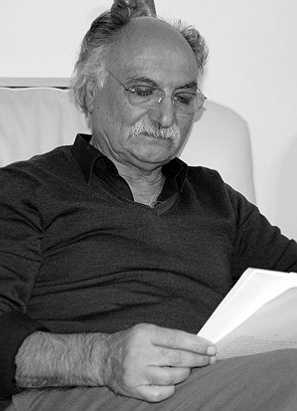Hossein Dowlatabadi, the son of Abdolrasoul and Fatemeh, the sixth son of the family, was born in the spring of 1326 in the village of Dowlatabad (second district of Sabzevar). He attended Massoud Sa’ad Elementary school in Dowlatabad, and like most other village lads, he labored in the fields at such agricultural tasks as weeding, gleaning, reaping, threshing, irrigating and sheepherding until his late teens. He also became acquainted with the craft of hairdressing, working alongside his father in the paternal barber shop.
In 1340 he went to Sabzevar to continue his studies at Ibn Yamin High School. But in 1342 his family migrated to the capital and as a result of the move his secondary studies were interrupted and he never returned to high school again. On his arrival in Tehran he took on house painting alongside his step brothers Ali and Hassan, at the same time attending courses at Kharazmy Night School. In 1344 he joined the air force and served as an « officer » for three years. During this period he continued following night classes. After obtaining his diploma in natural sciences, he took the Air Force Academy entrance examinations. On completing the exams he got into trouble with the commanding officer, whose insults Hossein would not take without retaliation. Things reached such proportions that he had to flee from the air force. During his years of « absence without leave, » he undertook trips to every corner of the country in search of work. To assure his subsistence, he took up house painting and other construction work again. He was hardly twenty-one years old when he fell in love with a girl called Sakineh Saboury. It was during his years of absence from the air force that at the age of twenty-four Hossein and Sakineh got married. The fruit of their loving union are three children: Maziar, Roxana and Anahita.
Some months after getting married, he was summoned to a military court and tried for insubordination, insults proffered to a superior officer and absence without leave. He was expulsed from the Royal Air Force and condemned to prison. Once out, he registered in a course of training as a teacher after which he obtained a teaching job in the educational system in Shahriar. A year after the revolution of 1357 he was accused of propagation of counter-revolutionary platforms, collusion with anti-revolutionary groups, and deviational publications. He was tried and « cleansed » out of the educational system. In 1359 together with a dear friend and the collaboration of someone with the technological know-how, he set up Ahantab workshop, constructing kitchen cupboards and office cabinets in metal. In 1362 the regime’s stranglehold and threats from its various military organs reached their height. Ahantab Workshop was assailed by the government’s hirelings. Hossein Dowlatabadi had to flee the region and shortly later the country. He fled to Turkey whence, after two and a half months, he flew to Paris and was accorded political asylum in France.
After a period spent in learning the language and acquainting himself with his new cultural and material environment, he worked as a house painter for two years. The emanations, especially from spray painting, undermined his health seriously and the doctors ordered him to abandon this profession. The employment agency oriented him towards accounting and after following classes for 18 months he obtained a degree but found no work in this field. So he enrolled in a taxi driving course and after a year of perseverance he passed the exams and got his license as a taxi driver from the Paris police. For 16 years he worked as a taxi driver in and around Paris until another serious illness obliged him to give up this work. Ill health forced him into retirement in1389.
From 1984 Hossein Dowlatabadi has lived in France, residing in the French capital or its suburbs.
Works :
Kaboudan (“Grey Land”, a novel, Amir Kabir Publications, Tehran, Iran, 1978)
Ghalamestan ( “Tree Farm”, a play, Iran Farda Publications, Paris, 1988)
Adam Sanghi (“Men of Stone”, a play, Iran Farda Publications, Paris, 1989)
Dar Ankara Baran Miyayad (“It Is Raining in Ankara”, a novel, Assr Jadid Publications, Sweden, 1992)
Istghah Bastille (“Bastille Station”, a collection of short stories, Afsaneh Publications, Sweden, 1995)
Godar (“The Ford”), a trilogy consisting of:
Mourianeha y Ghasr Firouz (“Termites of Ghasr Firouz”, first volume, 2003)
Nofous Ghasr Jamshid (“Lost Souls in Ghasr Jamshid”, second volume, 2005)
Moryaneh hay e ghasre dowran Pilgrims toTemple of the Time 2007
Bad Sorkh (“Red wind”, a novel, first printing 2009)
Tchoubin Dar (a novel, Forough Publications, first printing 2010)
> Zendan-e sekandar = Prisons of Alexander
> Savar kar-e piyadé = Horseless Rider
Jaye paye mar = Footprints of a Snake
> Khanéyé sheitan = Satan’s House
Neghah Sayar-e (‘View from a Moving Planet”, over twenty articles by the author available at www.dowlatabadi.net/)
